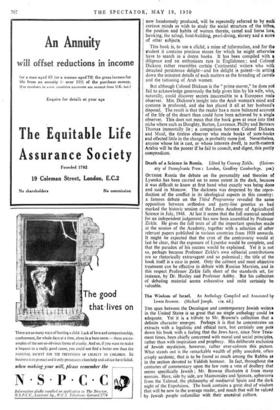Tim span between the Decalogue and contemporary Jewish writers in
the United States is so great that no single anthology could be adequate. Yet it is a tribute to Mr. Browne's collection that a definite character emerges. Perhaps it is that he concentrates on extracts with a legalistic and ethical turn, but certainly one puts down his book with a feeling that the Jews have, since New Testa- ment times, been chiefly concerned with moral and social principles, rather than with inspiration and prophecy. His deliberate exclusion of Jewish mysticism, however, rather over-colours this picture. What stands out is the remarkable wealth of pithy anecdote, often crisply sardonic, that is to be found as much among the Rabbis as in the section devoted to Yiddish humour. In fact, throughout the centuries of commentary upon the law runs a vein of drollery that seems specifically Jewish ; Mr. Browne illustrates it from many sources. Here, side by side, are Maimonides and Spinoza, aphorisms from the Talmud, the philosophy of mediaeval Spain and the dark night of the Expulsions. The book contains a great deal of wisdom that will be new to the average reader, and much that will be valued by Jewish people unfamiliar with their ancestral culture.










































 Previous page
Previous page